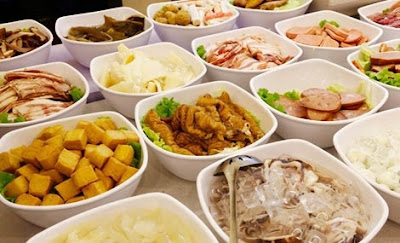Kitchen is the centre in a home, from where
various kinds of energies arise and spread and therefore it is very important
to mark out the area limit of each function.
Feng Shui, the celebrated and ancient Chinese
Art has two premises and two levels of practice. The first premise is that of
man's state of mind and energy, which affect his environment for good or bad.
The second premise is that of the condition of the environment which affects
man's mental conditions.
The Chinese medical model emphasizes on the
nutritional value of food and is most often referred to as the “post natal
chi”. Chi, implies the fundamental energy of the universe in this context,
referring to the positive energy of the individual derived from good food which
is essential to maintain proper and harmonious Feng Shui of the premises.
Kitchen being the essential requisite of a
dwelling, we find its remains from the earliest of civilizations, some dating
back to 5000 years. A cook normally requires the basic elements of earth, fire,
water and metal and it is also the source of everything that is grown and
cooked. The holding properties of the soil are used to make earthenware vessels
and utensils. All things that are brought into the Kitchen are altered in some
way and this process of change is a part of far larger cycle of energy – a
cycle that includes not only the preparation and cooking of food, but the
entire process of life itself.
The Chinese culture, celebrates culinary
atmosphere and the kitchen in poetic terms. If one has to understand and enjoy
the world of Feng Shui and the art of Chinese cooking, it is necessary to
understand the poetic logic of landscape to live, cook and eat in consonance
with the dynamic harmony of nature. The usual and common expression “you are
what you eat,” definitely conveys a truth that has been part of the Chinese
culture for centuries. One can change and transfigure oneself by what one eats.
We are in fact doing this and undergoing the changes every living second,
without even particularly thinking about it or being aware of it. The most
common ingredients in Chinese food are onions, ginseng, ginger root, garlic,
carrot and spinach and these are all invariably foods of medicinal value and
without exception one or other of these is being consumed by them in each meal.
A fundamental principle of Feng Shui is
that there should be a clear distinction between different functions within the
home and especially in a place like kitchen where the energies of different
kinds exist, it is mandatory to demarcate the areas of each function. A stove
or hob well defined and kept away from the water is most essential. A large
window behind the sink is essential and should not be behind the stove.
Colours like brown and beige are good for
the kitchen. Shades of yellow are the best suited colours. Darker brown tone for the flooring is good
and grouping all equipment that rely on water to one side is not only
convenient from the point of view of plumbing but also ensures that there is no
clash of element.
So it becomes apparent that a good and
healthy kitchen not only culminates into a preparing ground of good food but
also a healthy and harmonious environment which supports the occupants and
connects them with the energies of the premises.
For More...........:

No comments:
Post a Comment